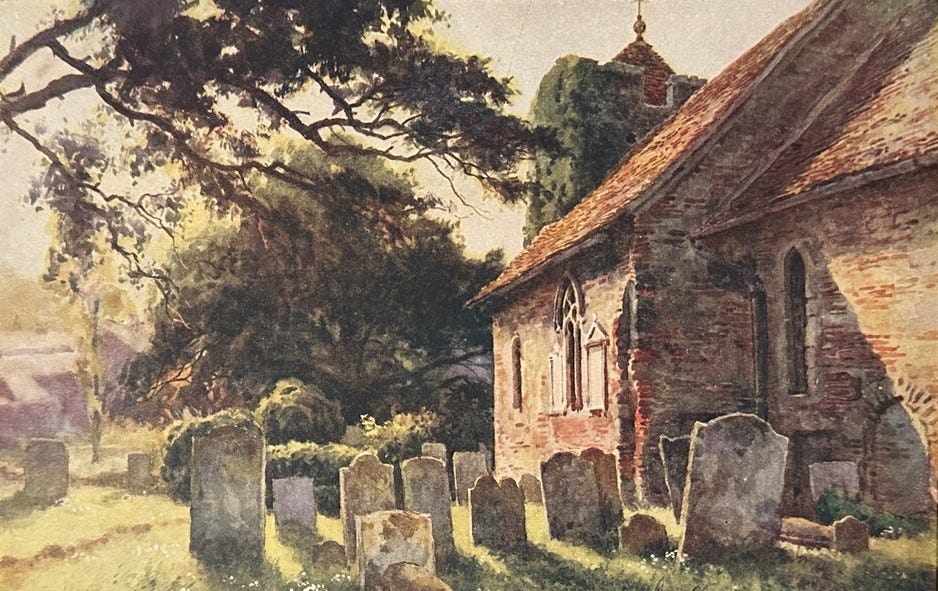Excerpt, from Elegy in a Country Churchyard
Manage episode 461293649 series 3540370
The scene is a bright borderland between heaven and a drab city below. One of the blest, a cheery Scotsman named George, has come down from the regions of bliss to meet our narrator and to teach him the secrets of genuine joy and love, human and divine. They’re secrets, not because God hides them, but because we human beings, such as we are, have weak eyes, even if we do look in the right places, and often we don’t. All at once a woman of splendid beauty comes down from the mountains, accompanied by a train of spirits, then of boys and girls scattering flowers to strew her way, and then even animals — dogs and cats, birds and horses. The narrator at first thinks it must be Mary, and he stammers to ask George, who anticipates him, saying no, it isn’t. “It’s someone ye’ll never have heard of,” he says. “Her name was Sarah Smith and she lived at Golders Green.”
A more humdrum name and place it is hard to imagine. But, George continues, “She is one of the great ones. Ye’ll have heard that fame in this country and fame on Earth are two quite different things.” This ordinary woman touched and blessed the lives of everyone who met her. “Every young man or boy that met her became her son — even if it was only the boy who brought the meat to her back door. Every girl that met her was her daughter.” And this made them more loving to their parents, truer to husband or wife. The world can’t see it, as I’ve said. But nothing is hidden from God.
As no doubt many of our readers know, that scene above comes from C. S. Lewis’ brilliant novel, The Great Divorce. And something like that sentiment we find in today’s Poem of the Week, by the wise, honest, and tender-hearted poet Thomas Gray. He is in a country churchyard, and he looks around at the memorials, and he asks a question that might occur to somebody who cares about human lives and all the secrets they hold. What were these people like? They lived in obscurity. It’s just a country village, after all. They had no great classical learning. They were far from the busy markets of the world. They did not exercise their lungs in the House of Commons. Who knows but God what they might have done, had Oxford or Cambridge been in their field of vision? Who knows what good, or what evil, their humble circumstances kept them from performing? But God does not judge in the subjunctive mood. He judges the heart; what man cannot see. Who can say that he really knows himself? The saint on earth, I think, is a hundred times more blessed than he knows. I think of my two grandmothers in this regard. Did they know how saintly they were? They hardly suspected they were good at all, because they did not dwell on themselves.
But Gray is in that churchyard, and he asks the questions that will occur to a man of large heart, moved by the human things — what no merely material improvements in life will change. What secrets do these homely memorials bear? And he imagines one soul especially, someone who might have been a poet, and perhaps was a poet in a small and secret way — not somebody who plays with words, but rather somebody who dares to explore, with sympathy, the human heart. That’s the soul whose Epitaph concludes the poem. The first excerpt below comes from Gray’s own musings; the second is that Epitaph, sober, gentle, and serene.
. . . Perhaps in this neglected spot is laid Some heart once pregnant with celestial Fire, Hands that the rod of empire might have swayed, Or waked to ecstasy the living lyre. But Knowledge to their eyes her ample page Rich with the spoils of Time did ne'er unroll: Chill Penury repressed their noble rage, And froze the genial current of the soul. Full many a gem of purest ray serene The dark unfathomed caves of ocean bear; Full many a flower is born to blush unseen, And waste its sweetness on the desert air. Some village Hampden that with dauntless breast The little tyrant of the fields withstood, Some mute inglorious Milton here may rest, Some Cromwell guiltless of his country's blood. . . The EPITAPH. Here rests his head upon the lap of earth A youth to fortune and to fame unknown; Fair Science frowned not on his humble birth, And Melancholy marked him for her own. Large was his bounty, and his soul sincere, Heaven did a recompense as largely send; He gave to Misery all he had, a tear; He gained from Heaven ('twas all he wished) a friend. No farther seek his merits to disclose, Or draw his frailties from their dread abode, (There they alike in trembling hope repose) The bosom of his Father and his God.Word & Song by Anthony Esolen is an online magazine devoted to reclaiming the good, the beautiful, and the true. We publish six essays each week, on words, classic hymns, poems, films, and popular songs, as well a weekly podcast for paid subscribers, alternately Poetry Aloud or Anthony Esolen Speaks. Paid subscribers also receive audio-enhanced posts and on-demand access to our full archive, and may add their comments to our posts and discussions. To support this project, please join us as a free or paid subscriber. We value all of our subscribers, and we thank you for reading Word and Song!
Thank you for supporting our mission at Word & Song!
10 епізодів





